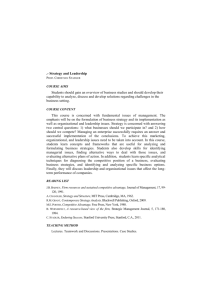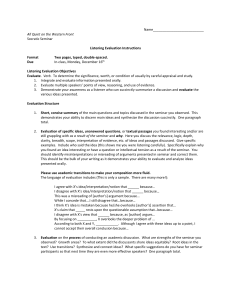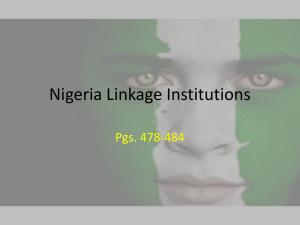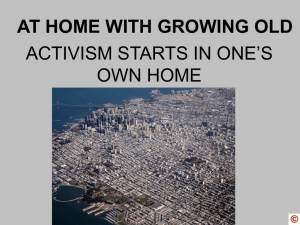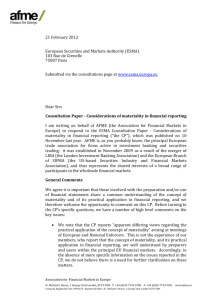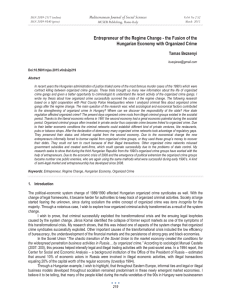Seminar Description
advertisement
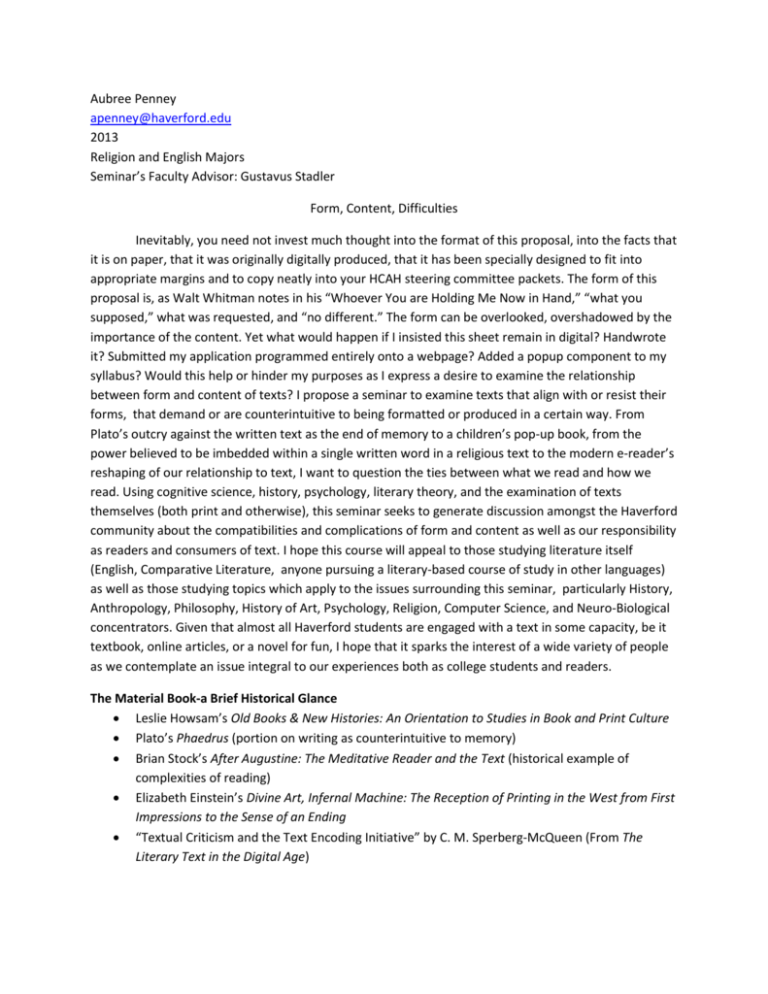
Aubree Penney apenney@haverford.edu 2013 Religion and English Majors Seminar’s Faculty Advisor: Gustavus Stadler Form, Content, Difficulties Inevitably, you need not invest much thought into the format of this proposal, into the facts that it is on paper, that it was originally digitally produced, that it has been specially designed to fit into appropriate margins and to copy neatly into your HCAH steering committee packets. The form of this proposal is, as Walt Whitman notes in his “Whoever You are Holding Me Now in Hand,” “what you supposed,” what was requested, and “no different.” The form can be overlooked, overshadowed by the importance of the content. Yet what would happen if I insisted this sheet remain in digital? Handwrote it? Submitted my application programmed entirely onto a webpage? Added a popup component to my syllabus? Would this help or hinder my purposes as I express a desire to examine the relationship between form and content of texts? I propose a seminar to examine texts that align with or resist their forms, that demand or are counterintuitive to being formatted or produced in a certain way. From Plato’s outcry against the written text as the end of memory to a children’s pop-up book, from the power believed to be imbedded within a single written word in a religious text to the modern e-reader’s reshaping of our relationship to text, I want to question the ties between what we read and how we read. Using cognitive science, history, psychology, literary theory, and the examination of texts themselves (both print and otherwise), this seminar seeks to generate discussion amongst the Haverford community about the compatibilities and complications of form and content as well as our responsibility as readers and consumers of text. I hope this course will appeal to those studying literature itself (English, Comparative Literature, anyone pursuing a literary-based course of study in other languages) as well as those studying topics which apply to the issues surrounding this seminar, particularly History, Anthropology, Philosophy, History of Art, Psychology, Religion, Computer Science, and Neuro-Biological concentrators. Given that almost all Haverford students are engaged with a text in some capacity, be it textbook, online articles, or a novel for fun, I hope that it sparks the interest of a wide variety of people as we contemplate an issue integral to our experiences both as college students and readers. The Material Book-a Brief Historical Glance Leslie Howsam’s Old Books & New Histories: An Orientation to Studies in Book and Print Culture Plato’s Phaedrus (portion on writing as counterintuitive to memory) Brian Stock’s After Augustine: The Meditative Reader and the Text (historical example of complexities of reading) Elizabeth Einstein’s Divine Art, Infernal Machine: The Reception of Printing in the West from First Impressions to the Sense of an Ending “Textual Criticism and the Text Encoding Initiative” by C. M. Sperberg-McQueen (From The Literary Text in the Digital Age) Form Conscious Content, Content Conscious Form “The Processural Page: Materiality and Consciousness in Print and Hypertext” by Joseph Tabbi in The Future of the Page (discusses Harry Matthew’s The Journalist) Harry Matthew’s The Journalist- imaginative embellishment as authorship William Least Heat-Moon’s Prairyerth-“Crossings” Walt Whitman’s “Whoever You are Holding Me Now In Hand” Avital Ronell’s The Telephone Book: Technology, Schizophrenia, Electric Speech Word Form Meets Word Content Stanislas Dehaene’s Reading In the Brain: the Science and Evolution of a Human Invention Ellen Lupton’s Thinking with Type, 2nd revised and expanded edition: A Critical Guide for Designers, Writers, Editors, & Students Religious texts: Genesis-the written word and the name of God (RSV Bible) and Fazlur Rahman’s Translating the The Qu’ran (language specific content) Cyril Elgood’s translation of Tibb-ul Nabbi or Medicine of the Prophet in which words from the Qur’an are imbued with healing powers Michael Keith’s Not A Wake (written in Pillish, so that the length of each consecutive word forms pi up to 10,000 decimals) Walter Abish’s Alphabetical Africa (lipogram) The Page as a Designated Container Bonnie Mak’s How the Page Matters Michael Camille’s “Glossing the Flesh: Scopophilia and the Margins of the Medieval Book” in The Margins of the Text Christopher De Hamel’s A History of Illuminated Manuscripts Edward Packard’s The Cave of Time (the first Choose Your Own Adventure book and a hallmark of Interactive Fiction) Art Spiegelman’s Open Me…I’m a Dog Possible trip to Special Collections? Form and Content in Conflict Joseph Tabbi’s “The Processural Page: Materiality and Consciousness in Print and Hypertext” in The Future of the Page Felix Feneon’s Novels in Three Lines Andy Warhol’s a, A Novel o pages 453-455 of Victor Bockris’ The Life and Death of Andy Warhol for historical background Kenneth Goldsmith’s Fidget Walt Disney’s The Many Adventures of Winnie the Pooh (questioning relationship between text and film as nod to textual materiality of Milne’s original works) The E-Book and Apps Joseph Tabbi’s Cognitive Fictions Jason Farman’s “Site-Specific Storytelling and Reading Interfaces” in Mobile Interface Theory: Embodied Space and Locative Media Terry Harold’s Ex-foliations: Reading Machines and the Upgrade Path (Electronic Mediations) (this is an ebook-form underscores content) Allison Muri’s “Virtually Human: The Electronic Page, the Archived Body, and Human Identity” in The Future of the Page Dorothy Kunhardt’s Pat the Bunny (text and i-Pad app) Alice i-Pad app –the “bedtime” version, the interactive version, and Carroll’s Alice’s Adventures in Wonderland itself William Blake’s Songs of Innocence and Experience (access to multiple versions of a single poem online, simplifying different printings and colorations of the same plates) Possible Speakers Kenneth Goldsmith A conceptual poet currently teaching at UPenn, Goldsmith’s work is often designed to contradict its physical mediation. For example, his piece Fidget recorded every move he made in one day. He has also done some interesting work about the line between plagiarism and “repurposing” in the Digital Age and the way the digital format has subsequently changed the content, and consideration, of academic writing. Matthew Stadler One of the Co-Founders of Publication Studio, whose work engages in publishing and the public space. Gus Stadler is hoping bring him and his printing press to campus next fall. Gus and I have spoken about the possibility of having a meeting in conjunction with this seminar, perhaps resulting in some kind of small publication exploring the bounds of the material text. Ideally, I would like to challenge each seminar member to create some kind of small project that would either be intrinsically bound to or contradict this method of material publication. Joseph Tabbi Currently teaching at the University of Chicago, Tabbi has worked with cognitive science and literary analysis in his book Cognitive Fictions in an attempt to explore the human relationship with text and electronic communication. He is also the editor of the electronic book review, a site which devotes itself to the examination of digital literature.



